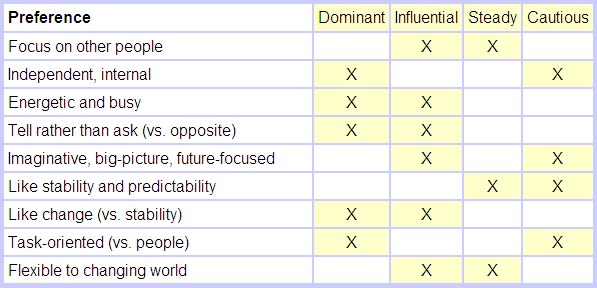Discovering Your Personality Type with the DISC System |
 | 1 |
|
|
Submitted by Teo Graca
| RSS Feed
| Add Comment
| Bookmark Me!
DISC is the popular system for determining personality types and was originated in the 1928 classic "Emotions of Normal People" by American psychologist William Moulton Marston. It has changed over the many decades, but is effectively made up of four distinct personality types. Although we all have some of these features, we all lean more towards one than the others. Most importantly, when you understand how these different personality types work, you can learn to communicate more effectively with others.
Meanings and descriptions of the DISC letters vary:
|
DISC type
|
Description
|
Dominant
(Direct, Driver, Demanding, Determined, Decisive, Doer) |
Pragmatic.
Independent, persistent, direct.
Energetic, busy, fearless.
Focus on own goals rather than people.
Tell rather than ask.
Ask 'What?' |
Influential
(Inducement, Inspiring, Impressive, Interacting, Interesting) |
Charismatic.
Social, persuasive, friendly.
Energetic, busy, optimistic, easily distracted.
Imaginative, focus on the new and future.
Poor time managers. Focused on people than tasks.
Tell rather than ask.
Ask 'Who?' |
Steady
(Sensitive, Submissive, Stable, Supportive, Shy, Status quo, Specialist) |
Sensitive.
Consistent, like stability.
Accommodating, peace-seeking.
Like helping and supporting others. Good listeners and counselors.
Close relationships with few friends.
Ask, rather than tell.
Ask 'How?' and 'When?' |
Conscientious
(Cautious, Compliant, Correct, Calculating, Concerned, Careful, Contemplative) |
Analitic.
Slow and critical thinker, perfectionist.
Logical, fact-based, organized, follows rules. Don't show feelings. Private. Few, but good friends.
Big-picture, outlines.
Ask 'Why?' and 'How?' |
Preferences associated with each personality type:

Preferences simplified:
| PREFERENCES |
Passive, Internal |
Active, Outgoing |
| Task-focused |
Conscientious |
Dominant |
| People-focused |
Steady |
Influential |
DISC decision factors simplified:
| DECISION FACTORS |
Slow Decision Makers |
Quick Decision Makers |
| Non-Emotional Decision Makers |
Conscientious |
Dominant |
| Emotional Decision Makers |
Steady |
Influential |
Using DISC In Relationship Building
When you understand someone's personality type, you can adjust your conversations appropriately to create more effective communication. There are certain traits associated with each personality type that allow you to build stronger relationships. Let's take a look at a few from each type.
With Dominant people
- Pragmatics at heart, time is always an issue
- Build respect to avoid conflict
- Focus on facts and ideas rather than the people
- Have evidence to support your argument
- Be quick, focused, and to the point
- Ask what not how
- Talk about "what" problems will hinder accomplishments
- Show them "what" they can do to succeed
With Influential people
- They want to feel good about what they are doing
- Be social and friendly with them
- Listen to them talk about their ideas
- Help them find ways to translate the talk into useful action
- Don't spend much time on the details
- They are generally disorganized, so motivate them to follow through to complete tasks
- Recognize their accomplishments
With Steady people
- They want to know you care
- Be genuinely interested in them as people
- Create a caring/human working environment for them
- Give them time to adjust to change
- Clearly define goals for them and provide ongoing support
- Recognize and appreciate their achievements
- Avoid hurry and pressure
- Present new ideas carefully
With Conscientious people
- They want details, as much as possible
- Warn them in time and generally avoid surprises
- Be prepared and don't ad-lib with them if you can
- Be logical and accurate, and use clear data
- Show how things fit into the bigger picture
- Be specific in disagreement and focus on the facts
- Be patient, persistent and diplomatic
Click for Details --> Find Your DISC Type! <--
|
